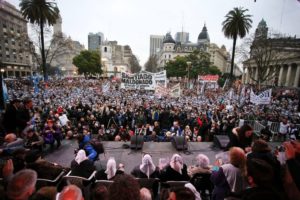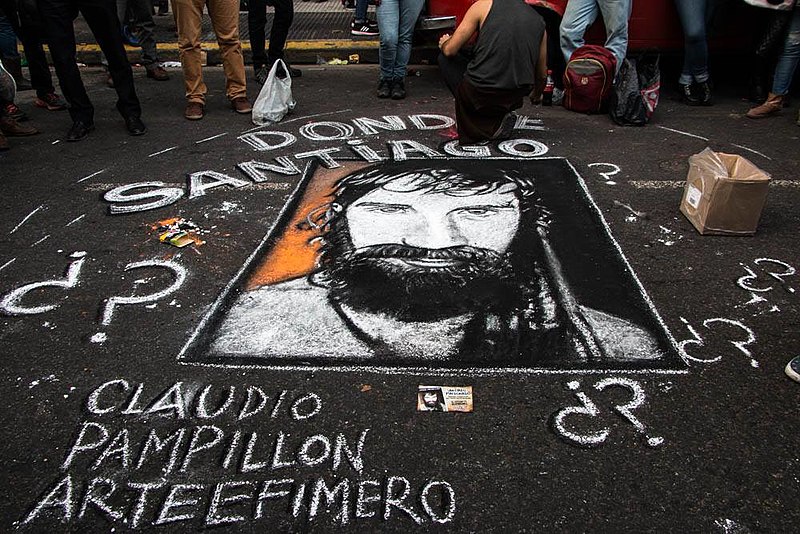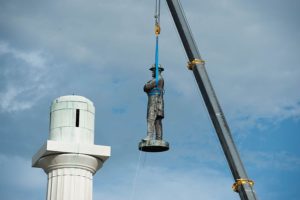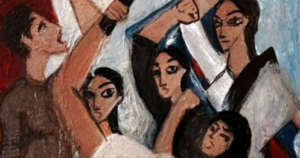Forced disappearances continue in Latin America
Photo via Moni Soria under Creative Commons license
This is the picture used when people would protest for Santiago Maldonado. His picture and the sentence “Where is Santiago Maldonado?” would be drawn, spray-painted, printed, and written all over Argentina.
November 6, 2017
The disappearance of Santiago Maldonado has shaken the entire country of Argentina, and his name has made its way through countless other countries in Latin America. Why is the vanishing of this activist causing multiple protests, violent riots, hashtags, and exasperated outbreaks?
Santiago Andres Maldonado was a 28-year-old Argentine who had flown in from La Plata, a province near Buenos Aires, to the province of Chubut neighboring Chile. There was an ongoing feud within the Mapuche tribe, who had built the establishment Pu Lof de la Resistencia of Cushamen and an Italian company named Benetton about territorial rights. The leader of the Resistencia Ancestral Mapuche, Facundo Huala, had been arrested for causing violent events and riots in order to gain attention to the injustices the Mapuche tribe is facing. Many members and allies of the Mapuche tribe formed protest demanding the release of Huala on a major route that separates the north and south of the country.
Maldonado was last seen at this protest, fighting for the indigenous rights of native Argentines. He and other protesters were soon reportedly detained by police that arrived at the route to break up the protest. This occurred on the first of August and hundreds of terrified Argentinians have since been demanding his safe return.
Government officials have released statements saying they did not have Maldonado, but the people of Argentina were not convinced, and for good reason, too.
From the 1970’s to the late 1980’s, the government of Argentina was a military dictatorship. An estimated 7,000 to 30,000 innocent civilians, ranging from pregnant journalists to public intellectuals, went missing throughout those years. All of these missing persons had one thing in common: they all shared similar leftist ideals that opposed the far-right government at that time.
These were horrific times for the people of Argentina — civilians were snatched from the very streets and later tortured to death, sent to camps similar to the concentration camps built by Nazis during World War II, or sedated with syringes and then dropped off into the icy Atlantic Ocean, still alive. People felt that they could not confide in the government at all. Argentine parents lived in constant fear of having their children abducted in plain sight, never to be seen again, if they did not share the same views as the people in power.
Argentina’s military dictatorship lasted until the early 80’s and is now a presidential republic, but this strange disappearance leaves Argentines who are still shaken by this brutal memory in a justifiable worry that a similar government plan could rise once more.

One of the many public protests demanding the safe return of Maldonado. Protests such as this have taken place all over Argentina.
Santiago Maldonado was found dead on Oct. 21, 2017, nearly 3 months after his disappearance and less than a week before an important government election took place. His death leaves an entire nation anticipating his safe arrival heartbroken.
Sickeningly enough, Argentina is not the only country to have this terrifying past with its own government. The Latin America Working Group Education Fund wrote about an estimated 32,000 disappearances in Colombia, most likely politically motivated. This alarming number could possibly be even higher, for many missing persons are not even registered on the government’s database.
Between 1954 and 1996, Guatemala had up to 40,000 civilians forcibly disappear due to government repression, and some of the bodies were found in sacks after being dumped in oceans by helicopters. Typically, those missing corpses were law students who were trying to use legal measures to confront their government. Grievously enough, the number of missing Guatemalans has risen up to 45,000 in 2013.
These forced disappearances have left generation after generation traumatized, terrified, and scarred. This recent dilemma involving Santiago Maldonado and the thousands of other missing Latinx only continue to deepen this bleeding wound that the citizen’s own governments have inflicted.
An end to these radical and inhumane murders must come at once — this major issue needs to be spoken about until action is taken place or else these gruesome government assassinations will continue to cripple the countries affected and plague the minds of the worried and enraged Latin Americans pleading for justice.








